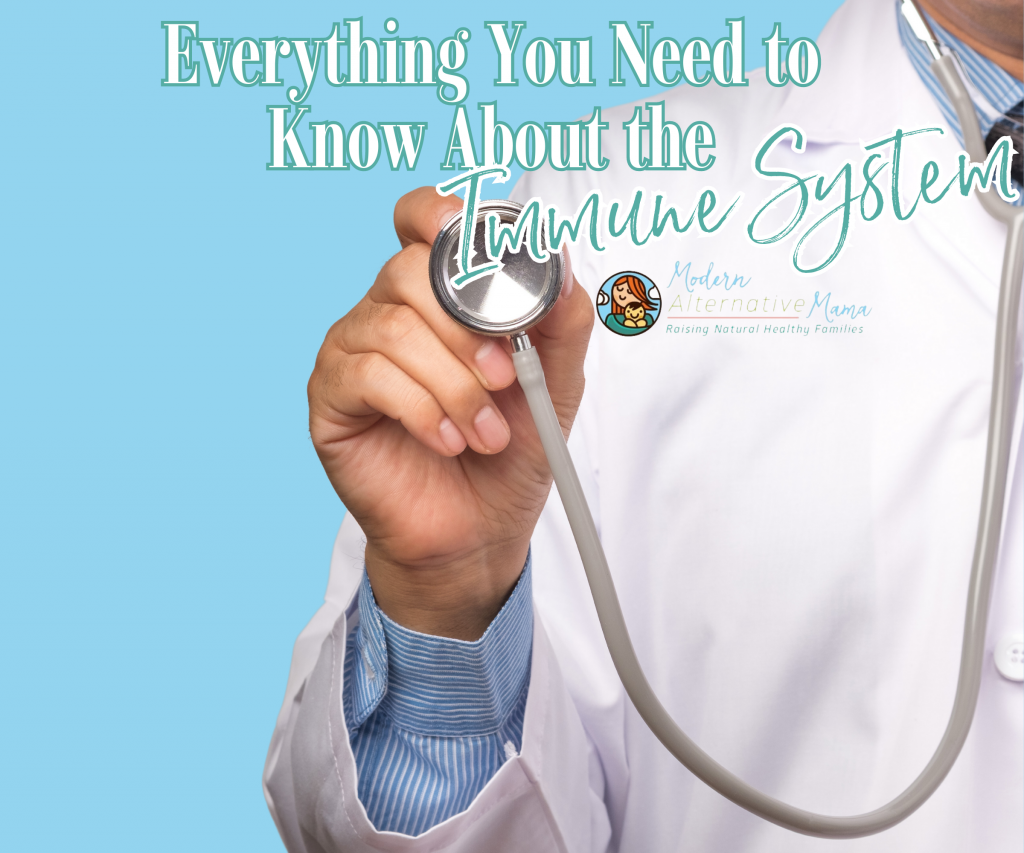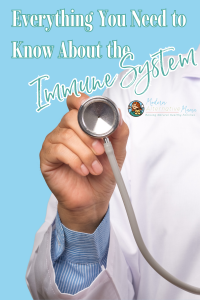As someone with an autoimmune disease, I often hear how people are “protecting” my health. Realistically, I am the only person capable of protecting my health. It is not anyone’s job, except my own, to protect my health. My health is my responsibility. Although people often don’t like hearing this, this is true.
Pharmaceutical drugs and vaccines are not the answer, especially when you have an autoimmune disease. Only I can give my body the necessary nutrients for a strong immune system. Understanding the immune system’s role and encouraging it to perform optimally is the only way to protect my health. Since my health is protected, I’d like to ensure yours is too.
Understanding the Immune System
The immune system protects the body from invaders (antigens) it doesn’t recognize, like bacteria, viruses, fungi, and toxins. The immune system comprises different organs, cells, and proteins that work together to trigger a bodily reaction to unknown substances. The immune system responds by surrounding and covering the invader to eliminate it (1).
We have two parts to our immune system – the innate immune system and the adaptive (or acquired) immune system. Both parts of the immune system come together, fulfilling three primary roles (1):
- Fight disease-causing germs (pathogens), removing them from the body
- Recognize and neutralize harmful substances from the body
- Fight disease-causing changes in the body, such as cancer cells
The innate immune system is the body’s first responder, creating barriers to protect the body. The innate immune system initiates a nonspecific, rapid response to invaders, ensuring they’re captured, contained, and neutralized. Think of the innate immune system as a Roomba, just roaming around, looking for germs to clean up (2).
The adaptive immune system makes antibodies to protect against harmful diseases. The adaptive immune system identifies and stores data, creating a database of specific or acquired responses to each antigen. When the adaptive immune system recognizes a previously encountered antigen, it responds with the corresponding antibodies to eliminate it (3). This system is always learning and can change its response to match new information it learns about each antigen.
Although the innate and adaptive immune systems are two very important parts of the immune system, the immune system is much larger than just those two systems. The immune system is made up of a complex collection of cells and organs, including (4):
- White blood cells
- Lymph nodes (that’s why when you’re sick, the doctor feels your throat)
- Spleen
- Tonsils and adenoids
- Thymus
- Bone marrow
- Skin, mucous membranes, and other first-line defenses
- Stomach and bowel
Sometimes, the immune system makes an error, reacting to the body’s own cells, causing inflammation and damage to healthy cells and a weakened immune system. This error is known as an autoimmune response or being immunocompromised (5). Signs of a weakened immune system include (6):
- Cold hands
- Bathroom problems
- Dry eyes
- Fatigue
- Mild fever
- Headaches
- Rash
- Joint aches
- Patchy hair loss
- Repeated infections
- Sensitive to sun
- Tingling or numbness in your hands and feet
- Trouble swallowing
- Unexplained weight change
- White patches on the skin
- Yellowing of your skin or eyes
Additionally, many things can impact your immune system. From general health to environmental toxins, ensuring everything functions smoothly is crucial for immune health.
Some things that can impact the immune system include:
- Gut health affects the diversity and composition of bacteria in the gut, affecting the immune cells (7). Check out Earthley’s Gut Health Support Guide.
- The endocrine (hormone) system is under the regulation of immune processes (8). Hormonal deficiencies can impact that (9). Check out Earthley’s guide, What No One Tells You About Hormone Balance.
- Cardiovascular health is a major determinant of the immune system. The heart itself is seen as an important immune station, able to fine-tune the function of the immune system (10). Check out our blog, 7 Ways To Support Heart Health Naturally.
- Brain health, such as mental health interventions, suggests increased efficiency in reducing inflammation and improving immune system function (11). Check out our blog, 5 Foods to Avoid For Your Mental Health.
- Exposure to inorganic substances and chemical pollutants like heavy metals and formaldehyde can damage the immune system (12). Check out Earthley’s guide, Fearless Healthy Living.
- Poor nutrition can compromise immune function and increase infection risk (13). Additionally, some nutritional deficiencies are associated with depression, which impacts mental and immune health. Take Earthley’s nutritional quiz today!
- Sleep (or lack of it) and the circadian system exert a strong regulatory influence on immune functions (14). Check out our blog, The 5 Key Nutrients that Promote Quality Sleep, or Earthley’s guide, The Secret to a Good Night’s Sleep.
- Stress was associated with increased natural immunity parameters and decreased immunity functions (15). Check out our blogs, Natural Ways to Reduce Stress & Anxiety and What Are Adaptogens (and What Ones To Use).
If the immune system functions ideally, it protects against germs after its initial encounter with bacteria, viruses, fungi, or toxins. Studies have estimated that the human antibody repertoire has the potential to make a quintillion (one million trillion) unique antibodies (16). The body (or immune system) stores all the information about a germ after its first encounter, especially how to fight it. Then, if it ever returns, the body recognizes it, analyzes the data, and can fight it faster – this is known as natural immunity. Think of natural immunity as a germ-fighting army. The antigens have waited their entire life with special intel on this particular intruder; now, their only mission is to destroy it. Remember, natural immunity varies according to the person and the germ, and supporting the immune system is crucial.
Boosting Vs. Supporting the Immune System
We’ve all heard of “boosting” the immune system, but that’s not how the immune system works. There is no shortcut to immunity, not in pills or vaccines. The purpose of the immune system isn’t to ‘rev it up’ into overdrive or create some kind of ‘super immunity;’ that’s not how immunity works. Instead, the goal is to support the body and optimize the immune system’s functions. When you support your immune system, you potentially support your body’s ability to fight sickness. That’s where food and herbs come into play.
Foods and herbs that can be used daily to support the immune system include:
- Astragulus (17) – Check out our astragalus herbal profile
- Coconut oil (18) – Check out Everything You Need to Know About Coconut Oil
- Cod liver oil (19) – Check out Everything You Need to Know About Cod Liver Oil
- Echinacea (20) – Check out our echinacea herbal profile
- Elderberry (21) – Check out our elderberry herbal profile
- Eleuthero root (22) – Check out our eleuthero root herbal profile
- Fermented foods (23)
- Garlic (24) – Check out our garlic herbal profile
- Ginger (25) – Check out our ginger herbal profile
- Green tea (26)
- Orange peel (27) – Check out our orange peel herbal profile
- Pumpkin (28)
- Shiitake mushroom (29) – Check out our shiitake herbal profile
Smoothies, freshly pressed juices, herbal teas, and even homemade meals with coconut oil are excellent ways to incorporate these foods and herbs.
Herbal tinctures are also an excellent way to quickly get some of these herbs in. Earthley offers Elderberry Elixir in two formulas. The original formula includes elderberries, astragalus root, cloves, ginger root, and mullein leaf. The kid’s formula includes elderberries, orange peel, mullein, and calendula.
Additionally, Earthley offers two DIY Elderberry Kits. No need to overbuy herbs or spend time researching for the best recipe. Simply boil in water and add honey, syrup, or a sweetener. Cough and Cold is made from elderberries, Ceylon cinnamon chips, turmeric root, and whole cloves. Immune Support is made from elderberries, rosehips, Ceylon cinnamon chips, and astragalus root. Each kit makes about two cups of syrup, enough to last one month for a family of four.
If you’re worried about taking elderberry with an autoimmune disease, consider adaptogenic herbs for immune support. Earthley’s Adaptogenic Immunity combines five certified organic herbs that can support the immune system, improve the body’s ability to cope with stress, and nourish you for total body wellness! This alcohol-free, botanical liquid is highly bioavailable and easy to assimilate. These herbs are generally safe even for people who have been told not to use “immune boosters.”
What to Do When Sickness Strikes
If you read Earthley’s Immunity Tool Guide, you know we’re always exposed to germs. Unfortunately, sometimes, when we’re rundown, germs can get a foothold in our bodies, and sickness strikes. When our immune systems function correctly, the body senses these foreign substances and launches a natural defense mechanism – among other things, a fever.
A fever is one of the body’s tools in activating the immune system to do its job effectively! It mobilizes parts of the immune system to fight and suppress/kill germs by creating an inhospitable environment (30). The increased temperature also activates other immune defenses to kill the bug. This is why lowering a fever is a bad idea.
Whether the illness is influenza, strep throat, bronchitis, or pneumonia, supporting your body’s natural process is crucial. Before attempting to lower a fever, consider supporting it by:
- Resting
- Keeping comfortable
- Staying hydrated – Check out Everything You Need to Know About Electrolytes
- Taking detox baths – Check out our 5 Detox Bath Recipes
- Supporting the lymphatic system – Check out Helping Your Lymphatic System







